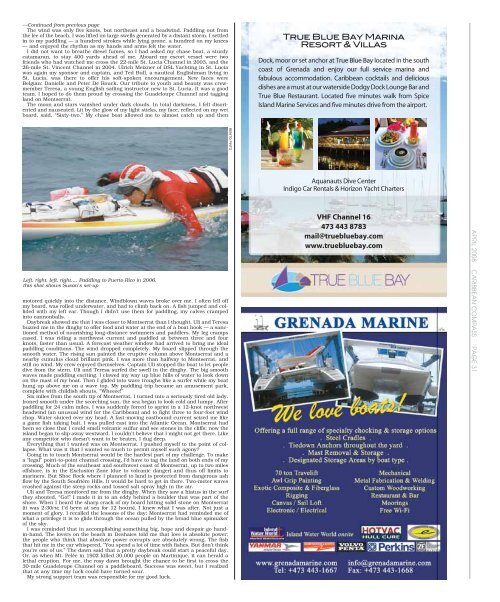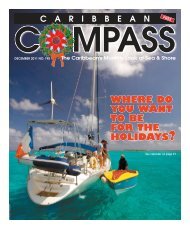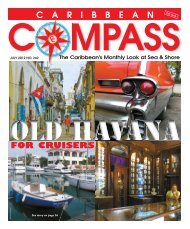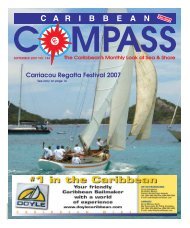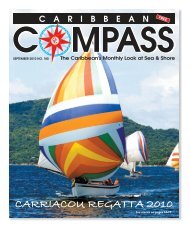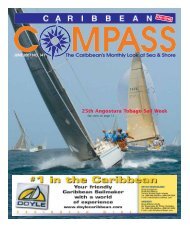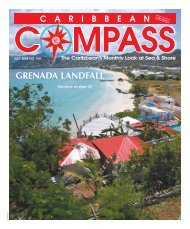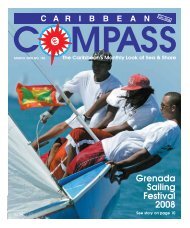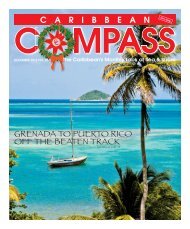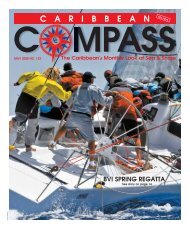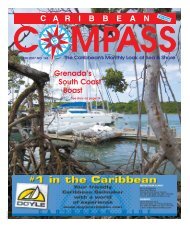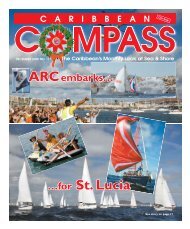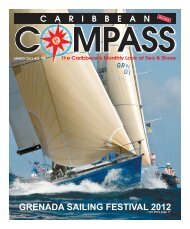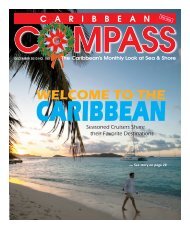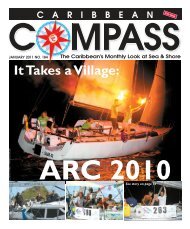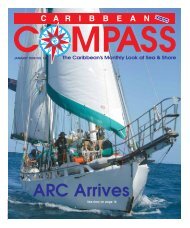Bequia Easter Regatta 2008 - Caribbean Compass
Bequia Easter Regatta 2008 - Caribbean Compass
Bequia Easter Regatta 2008 - Caribbean Compass
Create successful ePaper yourself
Turn your PDF publications into a flip-book with our unique Google optimized e-Paper software.
— Continued from previous page<br />
The wind was only five knots, but northeast and a headwind. Paddling out from<br />
the lee of the beach, I was lifted on large swells generated by a distant storm. I settled<br />
in to my paddling — a hundred strokes while lying prone, a hundred on my knees<br />
— and enjoyed the rhythm as my hands and arms felt the water.<br />
I did not want to breathe diesel fumes, so I had asked my chase boat, a sturdy<br />
catamaran, to stay 400 yards ahead of me. Aboard my escort vessel were two<br />
friends who had watched me cross the 22-mile St. Lucia Channel in 2003, and the<br />
26-mile St. Vincent Channel in 2004. Ulrich Meixner of DSL Yachting in St. Lucia<br />
was again my sponsor and captain, and Ted Bull, a nautical Englishman living in<br />
St. Lucia, was there to offer his soft-spoken encouragement. New faces were<br />
Belgian: Danielle and Peter De Rouck. Our tribute to youth and beauty was crewmember<br />
Teresa, a young English sailing instructor new to St. Lucia. It was a good<br />
team. I hoped to do them proud by crossing the Guadeloupe Channel and tagging<br />
land on Montserrat.<br />
The moon and stars vanished under dark clouds. In total darkness, I felt disoriented<br />
and nauseated. Lit by the glow of my light sticks, my face, reflected on my wet<br />
board, said, “Sixty-two.” My chase boat allowed me to almost catch up and then<br />
Left, right, left, right.… Paddling to Puerto Rico in 2006,<br />
this shot shows Susan’s set-up<br />
motored quickly into the distance. Windblown waves broke over me. I often fell off<br />
my board, was rolled underwater, and had to climb back on. A fish jumped and collided<br />
with my left ear. Though I didn’t use them for paddling, my calves cramped<br />
into cannonballs.<br />
Daybreak showed me that I was closer to Montserrat than I thought. Uli and Teresa<br />
buzzed me in the dinghy to offer food and water at the end of a boat hook — a sanctioned<br />
method of nourishing long-distance swimmers and paddlers. My leg cramps<br />
eased. I was riding a northwest current and paddled at between three and four<br />
knots, faster than usual. A forecast weather window had arrived to bring me ideal<br />
paddling conditions. The wind dropped completely. My board slipped through the<br />
smooth water. The rising sun painted the eruptive column above Montserrat and a<br />
nearby cumulus cloud brilliant pink. I was more than halfway to Montserrat, and<br />
still no wind. My crew enjoyed themselves. Captain Uli stopped the boat to let people<br />
dive from the stern. Uli and Teresa surfed the swell in the dinghy. The big smooth<br />
waves made paddling exciting. I clawed my way up blue hills of water to look down<br />
on the mast of my boat. Then I glided into wave troughs like a surfer while my boat<br />
hung up above me on a wave top. My paddling trip became an amusement park,<br />
complete with childish shouts, “Wheeee!”<br />
Six miles from the south tip of Montserrat, I turned into a seriously tired old lady.<br />
Ironed smooth under the scorching sun, the sea began to look cold and lumpy. After<br />
paddling for 24 calm miles, I was suddenly forced to sprint in a 12-knot northwest<br />
headwind (an unusual wind for the <strong>Caribbean</strong>) and to fight three to four-foot wind<br />
chop. Water sluiced over my head. A fast-moving eastbound current seized me like<br />
a game fish taking bait. I was pulled east into the Atlantic Ocean. Montserrat had<br />
been so close that I could smell volcanic sulfur and see stones in the cliffs; now the<br />
island began to slip away westward. I couldn’t believe that I might not get there. Like<br />
any competitor who doesn’t want to be beaten, I dug deep.<br />
Everything that I wanted was on Montserrat. I pushed myself to the point of collapse.<br />
What was it that I wanted so much to permit myself such agony?<br />
Going in to touch Montserrat would be the hardest part of my challenge. To make<br />
a “legal” point-to-point channel crossing, I’d have to tag the land on both ends of my<br />
crossing. Much of the southeast and southwest coast of Montserrat, up to two miles<br />
offshore, is in the Exclusion Zone (due to volcanic danger) and thus off limits to<br />
mariners. But Shoe Rock where I planned to land is protected from dangerous ash<br />
flow by the South Soufrière Hills. It would be hard to get in there. Two-meter waves<br />
crashed against the steep rocks and tossed salt spray high in the air.<br />
Uli and Teresa monitored me from the dinghy. When they saw a hiatus in the surf<br />
they shouted, “Go!” I made it in to an eddy behind a boulder that was part of the<br />
shore. When I heard the sharp crack of my board hitting solid stone on Montserrat<br />
(it was 2:30PM; I’d been at sea for 12 hours), I knew what I was after. Not just a<br />
moment of glory. I recalled the lessons of the day: Montserrat had reminded me of<br />
what a privilege it is to glide through the ocean pulled by the broad blue spinnaker<br />
of the sky.<br />
I was reminded that in accomplishing something big, hope and despair go handin-hand.<br />
The lovers on the beach in Deshaies told me that love is absolute power;<br />
the people who think that absolute power corrupts are absolutely wrong. The fish<br />
that hit me in the ear whispered, “You spend a lot of time with fishes. But don’t think<br />
you’re one of us.” The dawn said that a pretty daybreak could start a peaceful day.<br />
Or, as when Mt. Pelée in 1902 killed 30,000 people on Martinique, it can herald a<br />
lethal eruption. For me, the rosy dawn brought the chance to be first to cross the<br />
30-mile Guadeloupe Channel on a paddleboard. Success was sweet, but I realized<br />
that at any time my luck could have turned sour.<br />
My strong support team was responsible for my good luck.<br />
BENITO PINTO<br />
True Blue Bay Marina<br />
Resort & Villas<br />
Dock, moor or set anchor at True Blue Bay located in the south<br />
coast of Grenada and enjoy our full service marina and<br />
fabulous accommodation. <strong>Caribbean</strong> cocktails and delicious<br />
dishes are a must at our waterside Dodgy Dock Lounge Bar and<br />
True Blue Restaurant. Located five minutes walk from Spice<br />
Island Marine Services and five minutes drive from the airport.<br />
Aquanauts Dive Center<br />
Indigo Car Rentals & Horizon Yacht Charters<br />
VHF Channel 16<br />
473 443 8783<br />
mail@truebluebay.com<br />
www.truebluebay.com<br />
APRIL <strong>2008</strong> CARIBBEAN COMPASS PAGE 31


